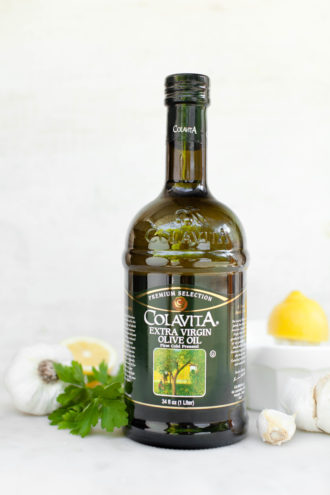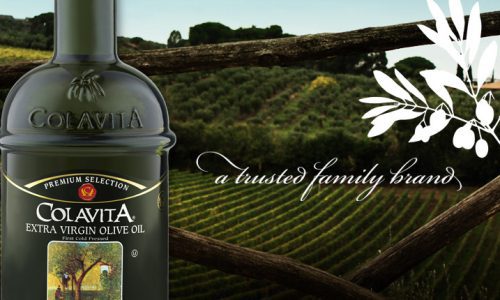
He was only four years old when he learned how to package the olive oil bottles by hand. It was then that Giovanni Colavita understood that the family’s passion would become his future. Raised in Molise, where his grandfather Giovanni established the Colavita olive oil company in 1938, Giovanni graduated with a Law degree from the University of Rome and then from the Bocconi University in Milan with a degree in Management.
Then came the decision to move to the United States, where in 2008 he was appointed as CEO of Colavita USA with the aim of continuing to conquer the North American market, where Colavita is the number one online brand, the fifth in retail sales. Quality, attention to the consumer and to demand, are key points of the Molisan company — those that his grandfather, Giovanni, always believed to be important. “My grandfather”, he told us, “always said: ‘if you lose a client due to the price of the product, you will have another possibility to gain back his trust later on, but if you lose him due to the quality that falls short of his expectations, you will lose that client forever’”.
From 2008 you are the CEO of Colavita USA with an aim to expand the brand in the U.S. market. What are the marketing and communication strategies that you adopted and continue to adopt?
“We began with food service because it is the industry – more than any other – thanks to the knowledge and skills of some chefs, which has demonstrated itself to be more sensitive and receptive in the use of extra virgin olive oil in the kitchen. From food services to the public, the transition occurred through our retail sales, promotional campaigns and awareness of a healthy lifestyle, a partnership with the Culinary Center, and the organization of some sporting events in partnership with the well-known Italian brand, Bialetti, where we leveraged the message of eating healthy foods and playing sports. Still today we invest a lot in communication through our social media, our website, thanks to the contributions and the professionalism of our in-house communications department where graphic designers, videographers and other internal resources work.
What are the most important outcomes that your company has reached to date?
“Colavita was the first Italian brand to introduce extra virgin olive oil Made in Italy to the American market. It was 1978, and then Colavita USA had been established by John J. Profaci, together with my uncle, Enrico. Today, we have five establishments in the United States and we are the number one extra virgin olive oil sold online, and the fifth in retail sales, but first in terms of premium quality and the number one brand in food services. We’ve grown 20% online in the last year alone, and we intend to continue growing even more. Colavita is distributed in over 80 countries and is recognized in the entire world as the top authentic Italian olive oil. In North America, we are leaders in the sale of premium extra virgin olive oil, Italian pasta, and Italian vinegar. 50% of our sales revenue is tied to exports: The United States is at the head, but also Asia, Oceania and to a lesser extent, Europe”.
From 1938 to date, what is the philosophy of continuity and innovation with respect to the first generation of the Colavita family?
“Passion, taking care of the company as a family, attention to quality, and therefore, to the consumer. I was four years old when I started helping my grandfather, Giovanni, in Molise, manually packaging bottles of oil. I grew up with that passion, that idea of managing a family business that grew a lot thanks to a continued effort, and above all, to quality”.
The American market is threatened by “Italian-sounding” and with regards to oil, by the phenomenon of adulteration of olive oil that an investigative report by the NY Times highlighted. How do you confront these problems and raise consumer awareness about Made in Italy?
“Instead of focusing all of our energy to fight the ‘Italian sounding’ phenomenon, Colavita  encourages, and is committed to, introducing the Made in Italy brand. Companies cannot tackle the ‘Italian sounding’ phenomenon on our own, but we can do a lot in terms of promoting the Made in Italy brand. The American consumer is very curious and points to the price-quality relationship rather than only Italianness. This last factor, in fact, was only last in the survey that we conducted with our consumers, where it was discovered that the price-quality relationship and variety are the elements that are most important, and not only Italianness in and of itself. Today, Colavita points towards Italianness as a synonym for quality, increasing the variety of products to accommodate the various needs of the consumer. The investigative reporting by the NY Times is the result of a marketing exercise financed by the California industry to boycott Italian oil through analyses and data that had been manipulated. We were concerned when the report was published, but we explained it to our customers and they trusted us”.
encourages, and is committed to, introducing the Made in Italy brand. Companies cannot tackle the ‘Italian sounding’ phenomenon on our own, but we can do a lot in terms of promoting the Made in Italy brand. The American consumer is very curious and points to the price-quality relationship rather than only Italianness. This last factor, in fact, was only last in the survey that we conducted with our consumers, where it was discovered that the price-quality relationship and variety are the elements that are most important, and not only Italianness in and of itself. Today, Colavita points towards Italianness as a synonym for quality, increasing the variety of products to accommodate the various needs of the consumer. The investigative reporting by the NY Times is the result of a marketing exercise financed by the California industry to boycott Italian oil through analyses and data that had been manipulated. We were concerned when the report was published, but we explained it to our customers and they trusted us”.
Along with the olive oil business, Colavita has for years has been involved in disseminating and promoting the Mediterranean diet. What feedback have you received?
“The North American market is large and complex. If on the East Coast consumers are more informed, in the central areas there is often still a need to win them over, besides educating them on consumption. It is a complex and subtle effort that we carry forward through a vast network of local agencies that help us to identify the needs of the consumer, and the sales managers that have a direct relationship with the retail store”.
There are many Italian companies present in North America. Is it still a major market and that which guarantees immediate success?
“The North American market is extremely competitive and you have to study it, understand it, in order to conquer it. It was much easier before for an Italian company to export to the United States because the logistics were easier, whereas now the large retail chains sometimes prefer not to buy if they don’t have a local presence. With the 2008 crisis in Italy, many companies saw exporting as a way out, and for many that’s what happened. For others, instead, it turned into bankruptcy because it is not enough to say that we export the Made in Italy brand to be a guarantee of quality, professionalism, and dependability. Many Italian products are available on the market and you need to be competitive in terms of the price-quality relationship, have nice packaging, understand the needs of the American consumer that is not unprepared and loves transparency”.
You represent the third generation of the Colavita family — how will Colavita be in 20 years?
“The generational shift has already taken place and the next will be the fourth generation. I grew up with a passion for this work, which was imparted to me by my grandfather and then by my father. Today, I impart a passion for doing things to my children, and not only passion for this line of work. Whatever they decide to do, I hope they do it with passion, even if they decide to follow a different route that will not bring them to work in the family business. We are prepared structurally even in the event that the company in the future must be overseen by managers outside of the family. What is important is to uphold the principles and traditions on which the philosophy and the style of Colavita are based”.

What is the most important thing that your grandfather, Giovanni, taught you?
“My grandfather always said: ‘If you lose a client due to the price of the product, you will have another possibility to gain back his trust later on, but if you lose him to the quality that falls short of his expectations, you will lose that client forever’”.
Translation by Emmelina De Feo










